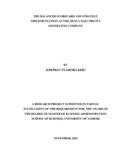| dc.description.abstract | The purpose of this study was to investigate on the the linkage of the balanced scorecard and strategy implementation at the Kenya electricity generating company. The study was investigating the strategy implementation process at KenGen. It sought to establish the practices adopted by KenGen in strategy implementation. It also sought to establish the challenges encountered by KenGen in implementing its strategies. The findings of this study will contribute to building the existing body of knowledge in strategic management and specifically on strategy implementation. A case study of KenGen was carried out. It involved an in-depth investigation of the phenomenon of strategy implementation. To obtain primary data, which was qualitative in nature, six top level executives were interviewed by use of interview guide. Secondary data was obtained from management information system, internet and printed records. The data collection instrument used was a semi-structured interview guide that was flexible and which gave the researcher an opportunity to probe further. Data was analyzed in accordance with the objectives of the study using content analysis method. Findings from the study indicate that various best practice principles were applied in strategy implementation at KenGen such as measuring the attainment of targets using the balanced scorecard and monitoring the implementation process by the Transformation Monitoring Office (TMO). The findings showed that these practices did support the implementation of the business plan (strategy). The results revealed the challenges of strategy implementation at KenGen as well as measures to overcome the challenges. For study implication, the study recommends that when an organization applies Balanced Scorecard, it need to take a very close look at the organization structure and evaluate if it supports the strategies. The study has also highlighted institutional policy and practice recommendations to overcome the challenges of strategy implementation using the balanced scorecard. Also, provided, are suggestions for further studies. The findings of this study are expected to assist the management of KenGen to exercise organization control by diagnosing the training and development needs of the future. It might also provide information to assist in the human resource management and performance management that could help to strengthen the relationship and communication between management and subordinates. This study might add on to the growing body knowledge of strategic management and to stakeholder theory whose aim includes the interpretation of the current events and a conceptual framework of business ethics and organizational management which addresses moral and ethical values in the management of an organization. Organizations might be able to understand the effects of balanced scorecard on their respective organizations and the industry as a whole and therefore may be prompted to seek ways through appropriate and proactive policies and procedures to enhance the adoption and implementation of the balanced scorecard methodology in their organizations and in the industry. | en_US |

